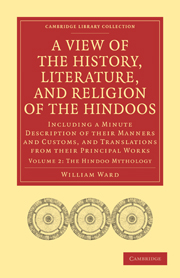 A View of the History, Literature, and Religion of the Hindoos
A View of the History, Literature, and Religion of the Hindoos Book contents
- Frontmatter
- Contents
- BOOK II OF THE TEMPLES, IMAGES, PRIESTS, AND TEMPLE WORSHIP OF THE HINDOOS
- BOOK III OF THE STATED PERIODS OF WORSHIP, AND VARIOUS DUTIES AND CEREMONIES
- BOOK V DOCTRINES OF THE HINDOO RELIGION
- CHAP. I OF THE TRANSMIGRATION OF SOULS
- CHAP. II JUDGMENT OF MEN AFTER DEATH
- CHAP. III OF FUTURE HAPPINESS
- CHAP. IV OF FUTURE PUNISHMENTS
- BOOK VI
- BOOK VII HINDOO RELIGIOUS SECTS
- CONCLUDING REMARKS
- APPENDIX: Scripture Illustrations from Hindoo Manners and Customs
CHAP. III - OF FUTURE HAPPINESS
Published online by Cambridge University Press: 29 August 2010
- Frontmatter
- Contents
- BOOK II OF THE TEMPLES, IMAGES, PRIESTS, AND TEMPLE WORSHIP OF THE HINDOOS
- BOOK III OF THE STATED PERIODS OF WORSHIP, AND VARIOUS DUTIES AND CEREMONIES
- BOOK V DOCTRINES OF THE HINDOO RELIGION
- CHAP. I OF THE TRANSMIGRATION OF SOULS
- CHAP. II JUDGMENT OF MEN AFTER DEATH
- CHAP. III OF FUTURE HAPPINESS
- CHAP. IV OF FUTURE PUNISHMENTS
- BOOK VI
- BOOK VII HINDOO RELIGIOUS SECTS
- CONCLUDING REMARKS
- APPENDIX: Scripture Illustrations from Hindoo Manners and Customs
Summary
The shastrŭs teach that there are four kinds of happiness after death: 1. That possessed in the heavens of the gods;—2. That when the person is deified;—3. That which arises from dwelling in the presence of the gods;—and, 4. In absorption. In the three first, the person is subject to future birth, but not in the last. The three first are obtained by works; the last by divine wisdom.
The descriptions which the pooranŭs give of the heavens of the gods are truly in the eastern style: all things, even the beds of the gods, are made of gold and precious stones. All the pleasures of these heavens are exactly what we should expect in a system formed by uninspired and unrenewed men: like the paradise of Mahomet, they are houses of ill-fame, rather than places of rewards for ‘the pure in heart.’ Here all the vicious passions are personified, or rather deified:—the quarrels and licentious intrigues of the gods fill these places with perpetual uproar, while their impurities are described with the same literality and gross detail, as similar things are talked of among these idolaters on earth. It would be a flagrant insult to compare these heavens with the place which our Saviour went to prepare for his disciples; but the serious enquirer after truth will be struck with this additional proof, that the Christian religion is ‘worthy of all acceptation.’
- Type
- Chapter
- Information
- A View of the History, Literature, and Religion of the HindoosIncluding a Minute Description of their Manners and Customs, and Translations from their Principal Works, pp. 170 - 180Publisher: Cambridge University PressPrint publication year: 2010First published in: 1817


